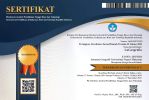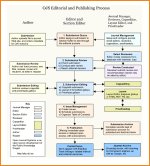Persepsi Masyarakat dalam Pengelolaan Kawasan Hutan Mangrove sebagai Wilayah Produksi di Kabupaten Luwu
(1) UNIVERSITAS NEGERI MAKASSAR
(2) UNIVERSITAS NEGERI MAKASSAR
(3) UNIVERSITAS NEGERI MAKASSAR
(*) Corresponding Author
DOI: https://doi.org/10.35580/lageografia.v18i2.12960
Abstract
Sustainable production forests are forests that can produce products of economic value that can be used for the needs of today's life and the future. The purpose of this study is to analyze people's perceptions in managing mangrove forests as production forests. Data collected in this study are primary data and secondary data. Primary data were collected directly from informants and respondents through direct interviews. Secondary data obtained through citing data from research results, journals, books, reports that have relevance to the research conducted. The population of this research is people aged 20 - 60 years. The sampling technique is carried out using proportional stratified random sampling, which is based on the stratification of the types of activities around the mangrove forest area. The results showed that it was concluded that people's perceptions of products produced by mangrove forests were very beneficial in addition to being a source of income as well as an alternative source of livelihood. In the case of managing mangrove forests as production forests, the community wants a division of management zones such as protected forest zones, conservation forests, production forests and cultivation zones. They also want them to be involved from the planning stage to the conservation / utilization of the economic resources of the mangrove forest.
Keywords
Full Text:
PDFReferences
Ferreira, A. C., and Lacerda, L. D. (2016a). Degradation and conservation of Brazilian mangroves, status and perspectives. Ocean Coastal Manage. 125, 38–46. doi:10.1016/j.ocecoaman.2016.03.011
Granek, E. F., Polasky, S., Kappel, C. V., Reed, D. J., Stoms, D. M., Koch, E. W., et al. (2010). Ecosystem services as a common language for coastal ecosystem-based management. Conserv. Biol. 24, 207–216. doi: 10.1111/j.1523-1739.2009.01355.x
Hogart, P.J. 1999. The Biology of Mangroves. Oxford University Press, New York.
Liu, K. & Li,X. 2008. Monitoring mangrove forest changes using remote sensing and GIS data with decision-tree learning wetlands. The Society of Wetland Scientists 28(2): 336-346
Manson, F.J., Loneragan, N.R. & Phinn, S.R. 2005. Spatial and temporal variation in distribution of mangroves in Moreton Bay, subtropical Australia: a comparison of pattern metrics and change detection analysesbased on aerial photographs. Estuarine, Coastal and Shelf Science 57: 653-666
Murray, M. R., Zisman, S. A., Furley, P. A., Munro, D. M., Gibson, J. & Ratter, J. 2003. The mangrove of belize Part 1. Distribution, composition and classification. Forest Ecology and Management, 174(1-3): 265-279.
Nagelkerken, I., Blaber, S. J. M., Boullion, S., Green, P., Haywood, M. & Kirton, L. G. 2008. The habitat function of mangroves for terrestrial and marine fauna: A review. Aquatic Botany 89: 155-185.
Orchard, S. E., Stringer, L. C., and Quinn, C. H. (2015). Environmental entitlements: institutional influence on mangrove social-ecological systems in Northern Vietnam. Resources 4, 903–938. doi: 10.3390/resources4040903
Queiroz, L. S., Rossi, S., Calvet-Mir, L., Ruiz-Mallén, I., García-Betorz, S., Meireles, A.J.d.A., et al. (2017). Neglected ecosystem services: highlighting the socio-cultural perception of mangroves in decision-making processes. Ecosyst. Serv. 26, 137–145. doi: 10.1016/j.ecoser.2017.06.013
Walters, B.B., Ro”nnbak”ck, P., Kovacs, J.M., Crona, B., Hussain, S.A., Badola, R., Primavera, J.H., Barbier, E. & Dahdouh-Guebas, F. 2008. Etnobiology, socio-economics and management of mangrove forests: A review. Aquat. Bot, 89: 220-236.
Article Metrics
Abstract view : 810 times | PDF view : 321 timesRefbacks
- There are currently no refbacks.
Copyright (c) 2020 Amal Arfan

This work is licensed under a Creative Commons Attribution-NonCommercial-NoDerivatives 4.0 International License.
LaGeografia: Jurnal Program Studi Pendidikan Geografi, Jurusan Geografi, Fakultas MIPA, Universitas Negeri Makassar.
Email: lageografia@unm.ac.id | +6285298749260
Editorial Office













































